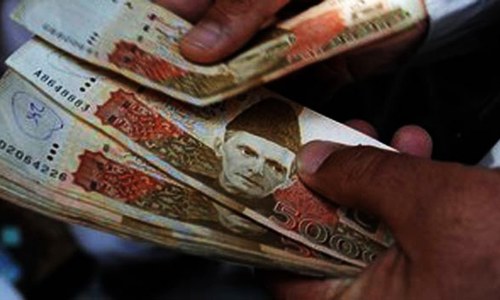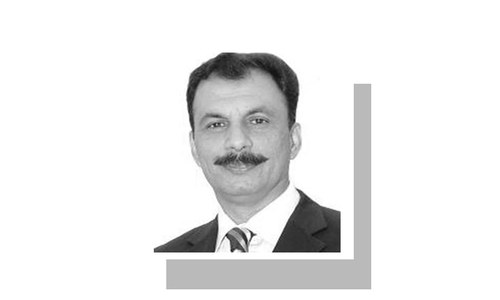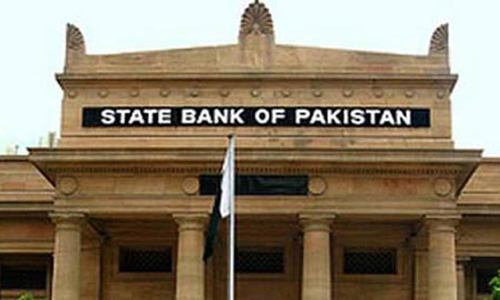
FINANCE Minister Ishaq Dar is in Washington, D.C. these days, and as could be expected, during his meeting with the treasury secretary, the question of action against terror financing was raised.
From the reported comments in the press, it appears the minister replied by pointing to the military operations against terrorist groups, as well as the amounts the government is having to spend in the course of these operations, and on the rehabilitation of internally displaced persons. Then he followed up with an assurance that appropriate steps were being taken to ensure that Pakistan’s banking system was not being misused by terrorist groups.
It is not clear how satisfied the secretary was with these responses, but we’ll have our answer in June when a meeting of the Financial Action Task Force is scheduled to determine whether Pakistan has indeed taken the required steps to implement its own action plan on terror financing. Thus far, Pakistan has been getting by primarily because the US government did not wish to push the country too hard, given the American troop engagements in Afghanistan.
There are two problems that Pakistan faces in fighting terror financing. One is that groups and individuals designated by the United Nations as terrorists continue to roam freely and operate large organisations in the country, largely because they enjoy protection from high quarters. The kinds of operations that these groups run cannot function on cash alone. Banning these groups may not cause terrorism to disappear from Pakistan, but it will certainly complicate the groups’ ability to operate on such a large scale because their transactions will then need to be done through benami accounts. It may not be difficult, but given the scale we are talking about, it would certainly hamper their operations.
In an environment as permissive as Pakistan’s, it is difficult to clamp down on illicit financial flows.
The second difficulty is a bigger one. Pakistan’s economy has a large amount of informal activity, which routinely uses the banking system yet evades other regulatory controls and tax measures. Former State Bank governor Shahid Kardar rightly pointed out once that Pakistan must be the only country in the world that has a legally recognised category of “non-filer of income tax returns”. All you have to do, if you don’t wish to pay tax and have your income registered with the state, is to pay a flat penalty on some transactions, like banking transactions, and you’re all good.
In an environment as permissive as this, it is difficult, if not impossible, to clamp down on illicit financial flows, especially terror financing. I lay special emphasis on terror financing because the financial requirements of terrorism are not very large, not very complex, and easily transacted through intermediaries to mask the real beneficiaries.
When using the term terrorist groups, I am omitting the large militias that, until recently, had captured swathes of the country, such as the Swat TTP. Those militias operate fleets of vehicles, maintain hundreds of armed men, procure weapons and ammunition in large quantities and have multimedia and social media cells operating under them. Even though the financial requirements of one such militia composed of a few hundred armed men would be far less than what a conventional standing army would require for fielding a battalion, those requirements are still considerable by comparison to the small cells that send suicide bombers into crowded places.
So building a regulatory regime that can track terror financing specifically, in a permissive environment like that of Pakistan, is a bit like finding a needle in a haystack. Still not impossible, given what algorithms and smart intelligence operations can do these days though. Recently, the State Bank has started operating an algorithm to search for money laundering taking place through the banking system, and over a period of time such capabilities are going to improve.
The big problem with finding money laundering, however, is the fact that powerful individuals, with the ability to thwart an investigation and the subsequent prosecution, are engaged in the practice. A large part of the purpose in building such capabilities is defeated when one knows that the most egregious examples of the practice will continue to flourish, while the system will only be permitted to capture the small fry who did not have the means to arrange for their protection.
The same problem presents itself in the fight against terror financing, albeit in magnified form due to the small sums of money involved, the absence of a signature transaction to hunt for, and the massive prevalence of benami transactions. Technology, coupled with sound intelligence, provides some leads in detecting such practices. But what to do when those apprehended turn out to enjoy protection from the high and mighty? It is difficult to even discuss such matters in our public discourse, as the hysteria surrounding the so called ‘Dawn leaks’ episode demonstrates so clearly — and producing concrete results appears like a distant goal.
The military operations that the finance minister reportedly pointed to when asked about terror financing cannot address this problem. The militias those operations targeted have scattered, some only to regroup across the border. The territory they held for a few years has been retaken. Many of their fighters have either been killed or captured, or have fled.
But the problem of terrorist groups embedded within the densely populated settled areas is a different ball game. They use the space provided by the informal economy, procure their materials from the wholesale markets, raise their recruits from establishments operating as institutions of learning, communicate using ordinary Sim cards and internet accounts, store their money in ordinary bank accounts, and so on.
When they use a Sim or an internet connection or a bank account, their actions leave a trace. If the rest of their movements could be similarly illuminated, and if the will is summoned to shut them down indiscriminately, the finance minister might yet have a fuller answer to give when asked about terror financing.
The writer is a member of staff.
Twitter: @khurramhusain
Published in Dawn, April 27th, 2017














































